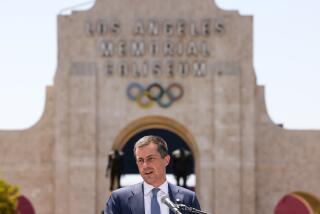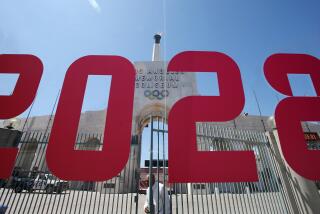Chicago’s transit budget at a crossroads
- Share via
CHICAGO — For more than a decade, Keith Williams has relied on the city’s pervasive network of buses, elevated trains and commuter rail lines to get downtown for work, attend school on the south side and shop at the sprawling malls in the northern suburb of Skokie.
But now, Williams is considering the unthinkable: buying a car.
“I have no idea how I’ll be able to afford it,” said Williams, 33, a customer service employee at a telecommunications company. “But I can’t bear this uncertainty anymore.”
These are tough times for commuters who rely on the Chicago Transit Authority, the nation’s second-largest public transportation system, which is used by about 1.6 million riders each day on bus and rail lines across the city and in 40 surrounding suburban areas.
For months, state lawmakers have been locked in debate over how to find more than $226 million to balance the 2007 operating budget for the transit system, which runs buses, the elevated train line known as “the El” and other regional rail, bus and shuttle lines.
On Friday, Illinois Gov. Rod R. Blagojevich authorized $27 million in state bond funds as an emergency funding stopgap for the transit authority to avoid steep fare hikes and deep cuts in schedules that officials said would take place this weekend. It’s the second time such a close call has happened this year.
Now lawmakers must figure out a long-term solution. But the issue, and some proposed solutions, have become bogged down in political bickering. A group of suburban and downstate lawmakers have refused to bail out Chicago’s transit system unless a multibillion-dollar, statewide construction plan to improve roadways and other transportation infrastructure is passed.
One way to finance the transit authority would be by expanding gambling across the state, including construction of a city-owned gambling complex in Chicago, some lawmakers say.
Illinois Rep. Julie Hamos, chairwoman of the state House Mass Transit Committee, introduced legislation that would use a regional sales-tax hike to help raise, in part, about $530 million a year for the Regional Transportation Authority, which oversees the agencies. The RTA, which backed the bill, is also calling for the state to invest billions to update and repair the system.
“This is a system that needs a lot of investment and improvement,” Hamos said. “We can’t risk having everything fall apart or further delayed.”
The public has grown weary of packed rail cars, lengthy delays and the occasional dangerous situation.
In January, the CTA fired several employees for failing to recognize poor track conditions before a subway derailment that sent about 150 passengers to the hospital. Highway construction that ensnarls commuter car traffic has sent scores of new transit riders onto aging buses and trains, taxing an already strapped transit system.
Transit officials had warned that if lawmakers couldn’t resolve the budget, they would have no choice but to cut services Sunday, which would have affected about 100,000 riders.
The plan called for cutting at least a quarter of the bus routes -- some of them specifically devoted to the rush-hour commute in and out of downtown -- and raising fares by as much as $1 and laying off 800 transit workers.
The tax-increase plan has failed so far to gather support among lawmakers in Springfield, Ill., which is why the governor approved the last-minute grant.
Blagojevich acknowledged that the money was temporary but said Friday that “anything that keeps the transit systems operating so people can get to work, school and wherever they’re going is better than service cuts, fare hikes and layoffs.”
“We’ve been through similar economic transit woes before, in the 1970s and 1980s,” said Ian Savage, a Northwestern University economics professor who specializes in transportation issues. “This is a problem that’s been building for decades, and it’s only getting worse.”
--
More to Read
Sign up for Essential California
The most important California stories and recommendations in your inbox every morning.
You may occasionally receive promotional content from the Los Angeles Times.










